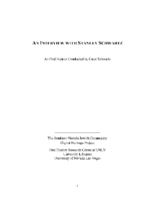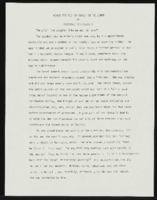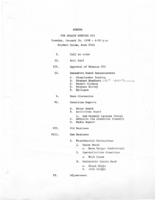Search the Special Collections and Archives Portal
Search Results

Yazmin Beltran oral history interview: transcript
Date
Archival Collection
Description
Oral history interview with Yazmin Beltran conducted by Rodrigo Vazquez and Barbara Tabach on February 4, 2019 for the Latinx Voices of Southern Nevada Oral History Project. Beltran discusses her early life in Mexicali, Baja California, Mexico and her childhood and upbringing in Mexico. In 2003, at the age of eighteen, she and her mother joined the rest of her family in Las Vegas, Nevada. After attending College of Southern Nevada and taking English as a Second Language classes, Yazmin began to write as a Spanish contributor for a publication in Reno, and became a writer for Spanish publications in Las Vegas, including El Tiempo, El Mundo, and Univision. Beltran's work for Univision led her to Texas, where she covered events and crises including the 2018 child separation occurring at the United States border, which she discusses in the interview. Finally, Beltran talks about being a journalist for The Nevada Independent and the importance of continuing to report in Spanish.
Text

Nathalie Martinez oral history interview: transcript
Date
Archival Collection
Description
Oral history interview with Nathalie Martinez conducted by Rodrigo Vazquez and Barbara Tabach on June 24, 2021 for Latinx Voices of Southern Nevada Oral History Project. Nathalie Martinez, one of the original members of the Latinx Voices project team, dicusses her personal history and the history of her parents who immigrated to the United States from Colombia and El Salvador. She shares her educational background and experiences working as an interviewer for the Latinx Voices project before its culmination and her graduation in 2021. Nathalie also talks about her work on the project's podcast and her work linguistically translating the interviews from Spanish to English.
Text

Transcript of interview with Stanley Schwartz by Carol Schwartz, March 1, 1980
Date
Archival Collection
Description
Interview with Stanley Schwartz by Carol Schwartz on March 1, 1980. Stanley talks about coming to Las Vegas in 1951 to open a clothing business on Main Street, Schwartz Brothers Clothing. He compares the business district of the 1950s to the district in 1980, and advertising opportunities in the newspapers and on the radio. Schwartz talks about suit styles and changing preferences of buyers, and moving the store to Second Street, then Fremont Street, then to Maryland Square Shopping Center. In 1970, he changed the focus of the clothing store to "big and tall" and talks about the importance of customer service in retaining customers. He mentions Al Benedict and Herb Tobman as people he admired.
Text

"Never Too Old To Forget Or To Learn": short story by Roosevelt Fitzgerald
Date
Archival Collection
Description
From the Roosevelt Fitzgerald Professional Papers (MS-01082) -- Short stories and poems by Roosevelt Fitzgerald file.
Text

Meeting minutes for Consolidated Student Senate, University of Nevada, Las Vegas, January 24, 1978
Date
Archival Collection
Description
Text

Interview with Stephen Craig Ronshaugen, November 26, 2004
Date
Archival Collection
Description
Text

Luis F. Valera interview, January 23, 2019: transcript
Date
Archival Collection
Description
Interviewed by Nathalie Martinez. Laurents Bañuelos-Benitez also participates in the questioning. Luis F. Valera serves as the Vice President of Government Affairs at UNLV. His heritage is from Venezuela and Cuba. He has served as the Chairman of the Latin Chamber of Commerce and has been an active member of the Latino community since his pursuing his undergraduate degree at UNLV in Political Science and his Juris Doctorate degree from the William S. Boyd School of Law. His various achievements in the community and nation led him to become recognized and awarded the Arturo Cambeiro Hispanic of the Year Award in 2011.
Text

Mario C. Monaco interview, March 12, 1981: transcript
Date
Archival Collection
Description
On March 12, 1981, Kim Rhodes interviewed Mario C. Monaco (born in Italy) about his life as an educator in Las Vegas, Nevada. During the interview, Monaco speaks about his various teaching positions, how he ended up in Las Vegas, the changes seen in the Clark County School District and how it compares to educational districts throughout the nation. Moreover, Monaco discusses wages and teacher education opportunities, sports and extracurricular activities in school, community involvement, and racial integration through busing. Lastly, Monaco talks about his appointment to Director of Vocational Education in the Clark County School Districts, the programs offered by the vocational center in the valley and the importance of education.
Text

James L. Hogan interview, October 12, 1975: transcript
Date
Archival Collection
Description
From the Ralph Roske Oral History Project on Early Las Vegas collection OH-00871. On October 12, 1975, collector Mary B. Hogan interviewed her father, farmer James L. Hogan (born April 6th, 1909 in Winton Place, Ohio) at the Hogan family home, in Las Vegas, Nevada. The interview covers the life of a Las Vegas old-timer. Mr. Hogan discusses moving to Las Vegas, early Las Vegas, Boulder Dam, and the Stewart Ranch. Colonel T. W. Miller and Vic Whittlesea are also mentioned.
Text

Transcript of interview with Russell Grater by Frederick Dougan, February 10, 1977
Date
Archival Collection
Description
On February 10, 1977, Frederick Dougan interviewed Russell Grater (born 1907 in Lebanon, Indiana) about his career in the U.S. National Park Service. Grater first talks about his move to the Southern Nevada area and his work that impacted the Hoover Dam project. He then talks about the town of St. Thomas, Nevada, the Lost City, and the activities of tourists. Grater also talks about his work in excavation, the indigenous American Indian tribes of the area, findings on petroglyphs, and the types of wildlife that were found in the area. He later talks about findings related to fossils, gold mining, the effects of World War II on the dam project, and vegetation in the area.
Text
